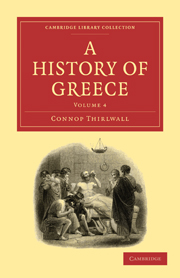Book contents
- Frontmatter
- Contents
- CHAPTER XXVII FROM THE CLOSE OF THE SICILIAN EXPEDITION TO THE BEGINNING OF THE RUPTURE BETWEEN THE SPARTANS AND ALCIBIADES
- CHAP. XXVIII FROM THE BEGINNING OF THE RUPTURE BETWEEN THE SPARTANS AND ALCIBIADES TO THE OVERTHROW OF THE FOUR HUNDRED AT ATHENS, AND THE RESTORATION OF ALCIBIADES
- CHAP. XXIX FROM THE OVERTHROW OF THE FOUR HUNDRED TO THE BATTLE OF NOTIUM
- CHAP. XXX FROM THE BATTLE OF NOTIUM TO THE END OF THE PELOPONNESIAN WAR
- CHAP. XXXI FROM THE END OF THE PELOPONNESIAN WAR TO THE REESTABLISHMENT OF DEMOCRACY AT ATHENS
- CHAP. XXXII RETROSPECTIVE SURVEY OF THE INTERNAL CONDITION OF ATHENS DURING THE PELOPONNESIAN WAR, CARRIED FORWARD TO THE RENEWAL OF HOSTILITIES BETWEEN ATHENS AND SPARTA
- CHAP. XXXIII THE EXPEDITION OF CYRUS THE YOUNGER
- CHAP. XXXIV THE RETURN OF THE GREEKS
- CHAP. XXXV FROM THE RENEWAL OF HOSTILITIES BETWEEN SPARTA AND PERSIA TO THE DEATH OF LYSANDER
- CHAP. XXXVI FROM THE DEATH OF LYSANDER TO THE PEACE OF ANTALCIDAS
- APPENDIX
CHAP. XXX - FROM THE BATTLE OF NOTIUM TO THE END OF THE PELOPONNESIAN WAR
Published online by Cambridge University Press: 05 July 2011
- Frontmatter
- Contents
- CHAPTER XXVII FROM THE CLOSE OF THE SICILIAN EXPEDITION TO THE BEGINNING OF THE RUPTURE BETWEEN THE SPARTANS AND ALCIBIADES
- CHAP. XXVIII FROM THE BEGINNING OF THE RUPTURE BETWEEN THE SPARTANS AND ALCIBIADES TO THE OVERTHROW OF THE FOUR HUNDRED AT ATHENS, AND THE RESTORATION OF ALCIBIADES
- CHAP. XXIX FROM THE OVERTHROW OF THE FOUR HUNDRED TO THE BATTLE OF NOTIUM
- CHAP. XXX FROM THE BATTLE OF NOTIUM TO THE END OF THE PELOPONNESIAN WAR
- CHAP. XXXI FROM THE END OF THE PELOPONNESIAN WAR TO THE REESTABLISHMENT OF DEMOCRACY AT ATHENS
- CHAP. XXXII RETROSPECTIVE SURVEY OF THE INTERNAL CONDITION OF ATHENS DURING THE PELOPONNESIAN WAR, CARRIED FORWARD TO THE RENEWAL OF HOSTILITIES BETWEEN ATHENS AND SPARTA
- CHAP. XXXIII THE EXPEDITION OF CYRUS THE YOUNGER
- CHAP. XXXIV THE RETURN OF THE GREEKS
- CHAP. XXXV FROM THE RENEWAL OF HOSTILITIES BETWEEN SPARTA AND PERSIA TO THE DEATH OF LYSANDER
- CHAP. XXXVI FROM THE DEATH OF LYSANDER TO THE PEACE OF ANTALCIDAS
- APPENDIX
Summary
When Conon came to Samos, he found the fleet under his command superior in numbers to the enemy: but despondency was prevailing among the men; partly perhaps a consequence of the recent defeat: it was however probably still more owing to the want of full and regular pay, and to the contrast which they saw in this respect between their own prospects and those of the Peloponnesians, who were provided with an ample and unfailing supply from the inexhaustible riches of the Persian treasury. The Athenian crews appear to have been thinned, as Lysander predicted, by frequent desertions, and Conon deemed it expedient to reduce the numbers of his armament from above a hundred to seventy galleys that each might have its proper complement. His next care was to provide for its immediate exigencies; and he was compelled, as Alcibiades had been, to employ it in expeditions which had no other object than the plunder to be collected in the descents which he made on the enemy's coasts. The autumn and winter passed without any more important operations; for Lysander did not stir from Ephesus. He probably did not feel himself strong enough to seek an engagement; but his attention was also deeply engaged by affairs of a different nature. His ambition was not such as commonly animated a Spartan general: the desire of glory earned in his country's service.
- Type
- Chapter
- Information
- A History of Greece , pp. 113 - 173Publisher: Cambridge University PressPrint publication year: 2010First published in: 1837



